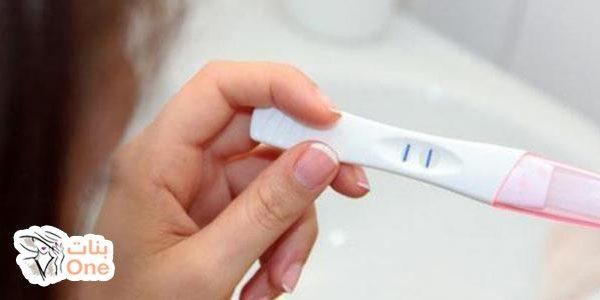To avoid false hope, do not make these mistakes when taking a pregnancy test
Taking a pregnancy test can seem like a huge event, and you may feel nervous, excited, anxious, panicked, panicked or a mixture of them, but before you head to the nearest pharmacy to buy all the tests, you need to be wary of a few things.
In a report published by the American "Health Digest" website, writer Lauren Barth touched on the common mistakes women make while taking a pregnancy test. Here are all the do's and don'ts when taking a home pregnancy test.
1. Take the test as soon as your period is late
If you have been anxiously waiting to find out if you are pregnant or not, you may take a pregnancy test as soon as possible. But getting the test too soon won't give you the peace of mind you're looking for. Testing too early can lead to false negatives, because the hormone HCG may not be detectable yet. This is the hormone that stimulates the production of increased estrogen and progesterone during pregnancy, and you can also get a false positive result.
According to the Mayo Clinic, "a false pregnancy can occur in the event of a miscarriage shortly after the fertilized egg has attached to the uterine lining." Therefore, in order to get an accurate result, try to wait until your period has passed completely.
2. You're using the wrong kind of pregnancy test
If you are trying to conceive for the first time, you may be confused about which types of tests are most effective. There are blue dye tests, pink dye tests, digital tests, and urine chemically reacts to dye tests that reveal one or two lines whether the result is positive or negative. Although digital tests, which are usually more expensive, display "pregnant" or "not pregnant," these tests may be less sensitive to hCG.
Although chromosomal pregnancy tests are usually equally effective, the chance of an evaporation line appearing in blue dye tests is low, and the test may indicate pregnancy, when in fact it is negative.
You may become more confused and less confident about the results. Dr. Sherry Ross, an obstetrician and gynecologist, recommended the pink test.
3. Rush to read the test result
The writer advised to wait before taking a pregnancy test, and read the attached instructions to take advantage of it. Although most pregnancy tests are used in a similar way, there are some subtle differences between them.


Accurate information should answer all your questions, but you should pay special attention to how long you have to wait before reading the results. If you're already pregnant, the chemical reaction may not occur immediately, and it may take a few minutes for hCG to be detected and an evaporation line to appear.
4. Excessive waiting to read the test result
The author points out that pregnancy test instructions are there for a reason, which is why you're supposed to wait a certain amount of time before checking the results. However, do not wait too long to check the result or miss the recommended time frame.
In other words, being late in seeing the result can cause an evaporation line to suddenly appear, so you think you're actually pregnant, but you're not.
According to the Health Line website, although the evaporation line can appear even if you don't wait long, "the possibility of it being wrong is high if you are late in seeing the test result."
5. Taking a pregnancy test at the wrong time of the day
If your period is late, it may be best to wait until the next morning to take a pregnancy test, and for good reason, Healthline explains that “the first drops of urine in the morning” contain the highest concentration of hCG levels in the body. The first stage of pregnancy.
6. You are using an expired pregnancy test
Not all pregnancy tests are sold individually, some are sold in boxes containing two or more tests. If you bought a pack of two tests, used one test and stored the other, check the pack after you take it out of the medicine cabinet and use it. Such tests have a limited shelf life, so you should check the expiration date, as it is likely to result in an inaccurate result.
7. False pregnancy due to fertility drugs
If you want to get pregnant, getting a positive pregnancy test result is a joy, but you have to bear in mind that there are some medications that contribute to getting a false positive result, and this will make you feel frustrated after the blood test.
Many fertility drugs, including those used during in vitro IVF, contain human chorionic gonadotropin, the same pregnancy hormone that causes the chemical reaction on a pregnancy test.
"Women who are trying to conceive often take a pregnancy test early and get a positive result," Dr. Zev Williams, a professor of obstetrics and gynecology at Columbia University, explained to the American magazine "Self."
8. Possible error
If a woman has a miscarriage and wants to get pregnant again in the subsequent weeks, she may get a false positive result. According to Williams, "chorionic gonadotropin can remain in a woman's body for weeks or even months as long as there are viable placental cells inside the woman's uterus, so the next test may show a false positive result."
An ectopic pregnancy can also result in an incorrect positive result. If you have a positive pregnancy test, and you have severe abdominal cramps, bleeding or dizziness, see your doctor. An ectopic pregnancy can be life-threatening.
9. Reusing a pregnancy test
Do not repeat the pregnancy test. According to Healthline, a chemical reaction occurs when urinating on a pregnancy test, and once a reaction occurs on the test strip - whether it is positive or negative - you cannot use it again because it will not result in a second chemical reaction. This also means that if you accidentally drop it in water or any other liquid, you should throw it away and get a new one.
After confirming your pregnancy, the first thing you should do is contact your gynecologist and make your first appointment. The doctor will likely delay the appointment by a few weeks, but he or she may give you some important information.
You should also tell your doctor if you have a chronic illness, or have had miscarriages in the past, as this information is likely to prompt your doctor to schedule a screening appointment as soon as possible.










